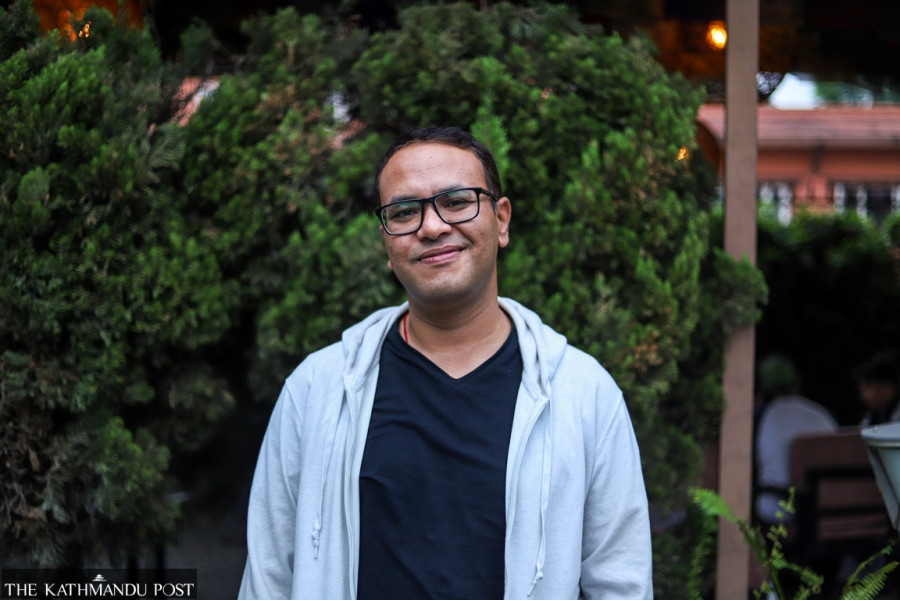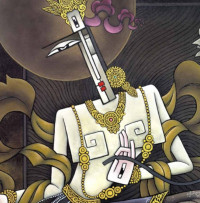Culture & Lifestyle
‘Lori’s’ success has made my mother happy and hopeful about my career’
Abinash Bikram Shah on what winning the Special Mention of the Jury at this year’s Cannes film festival means for him and his short film ‘Lori’, his experiences in Cannes, and what inspired him to make the film.
Shranup Tandukar
Scriptwriter and director Abinash Bikram Shah recently made headlines after his film ‘Lori: Melancholy of my mother’s lullabies’ won Special Mention of the Jury at the 75th edition of the Cannes film festival. The film, which was one of the nine short films selected out of 3,507 films for the The Short Film Palme D'or’ category, deals with child marriage and the overarching influence of patriarchy in such marriages.
Its synopsis reads, “A mother sings lullabies to her 12-year-old daughter in order to calm her down. But, when the lullabies end, and the daughter comes to her senses, the reality turns out to be much grimmer, and life-altering.”
Shah, who returned back to Nepal a week ago after the end of the Cannes Film Festival and his visit to Greece, is currently working on a project with Min Bahadur Bham, one of the most acclaimed Nepali film directors. He is also planning to shoot his first feature film ‘Elephants in the Fog’ from 2023. He sat down with the Post’s Shranup Tandukar to discuss his experiences in Cannes, the production of ‘Lori’, and what the film’s success means to him.
This interview has been edited and condensed for clarity.
How was the process of applying for the Cannes?
Actually Sandeep Badal(production designer of ‘Lori’) encouraged me to submit the film for Cannes. At that time, I was in the US for a residency programme and I didn’t have time to submit, so Sandeep submitted the film. We simply went into the website and it was a free submission. We just had to write a logline, provide details of the team members, and then upload the film.
Thousands of short films are submitted every year to Cannes, and I was doubtful of even submitting the film. I wasn’t really confident of trying but Sandeep encouraged and pushed me to submit the film and thankfully it all turned out well. There was a little bit of hope as one always has some hope for one’s works but filmmakers all over the world send their short films to Cannes so with the intense level of competition, I didn’t have high hopes for the success of ‘Lori’.
I guess that is the thing for most people in the art field. There is always a sense of doubt regarding one’s creation. I thought my film was only decent but after the film got selected, I got a sense of validation that I was on the right track. And after winning the award itself, I was encouraged to keep continuing with my filmmaking journey.
Did you start shooting ‘Lori’ with an aim to submit it to international film festivals?
No, a Hong Kong-based production company called Petra Films had funded the film. They had funded a total of four films in Nepal, which were initially feature-length. Originally they had planned to showcase these films on their own platform but after the completion of this film, the production company had some internal issues and everything was stalled. So, we just decided to trim the film down to a short film length, submit it to film festivals and see how things go.
We started the submission process with Cannes, much like most filmmakers. The way the popular international film festivals’ are scheduled means that Cannes is the first one to occur. The order goes like this: Cannes, then Venice, then Locarno, then Berlin. We were lucky that the film got selected in Cannes itself.
When we talked last time, you had mentioned that all your writings come from a personal place. For ‘Lori’, what was the inspiration?
When I was a child, my father used to live in Tarai and my mother lived in Kathmandu. I studied here in Kathmandu but for my vacations and holidays, I would travel to Tarai and during those visits, I got a chance to witness Tarai’s vibrant culture. Unfortunately, my father passed away when I was in grade 10. After that, I was raised by my mother and I had only sisters so I was raised in an environment where I was surrounded by female relatives. Maybe the inspiration for the film also came from this experience.
But the main inspiration for the film was what I had seen and experienced myself during my childhood. When I was a kid, my friend got married when she was a child. Her wedding took place in a village far from ours and I still remember going for the marriage procession with my father. Throughout the years, I witnessed many more child marriages like this. Then again in recent years, I read another news article about child marriage somewhere in Nepal. It was the same situation when I was a child decades ago and it’s still prevalent now. So, I had thought why not make a film on this issue.
Also, I have seen my mother and her struggles. There is hopelessness yet there’s also unyielding courage underneath that hopelessness for females in Nepal. After my father passed away, my mother raised me alone and I have witnessed the level of sheer resilience and strength she has shown throughout the years yet there was always the suffocating blanket of patriarchy looking to oppress her. Maybe that’s the reason why I wrote ‘Lori’. I don’t know if I have embedded a part of me in this story but this story did come from somewhere inside me and from my experiences.
I feel like my experiences growing up with my mother and sister always somehow influences and permeates my stories and writings. I don’t think about including my personal experiences in a conscious way but it always gets blended into my stories one way or the other.
The aspect ratio for the film is different. It's square-shaped and it induces an uncomfortable feeling of restriction. Was there any special reason behind this choice?
The aspect ratio for this film is 1:1 and there are two reasons why this choice was made. The first one was that it reflects the headspace of the main character who is about to be married away and feels confined. Most films in Nepal have a wide aspect ratio and there’s beauty conveyed through this but its overuse is one of the problems in Nepali films. The other reason was to symbolise a sense that the audiences are looking into the experiences and culture of a community through a window.
Initially, in the pre-production phase, we had actually decided against using 1:1 ratio for the film. It was going to be released on an online platform mainly targeting the Nepali audience so we wanted a conventional aspect ratio which would have a mainstream appeal for the audience. But later on, we tested out the 1:1 ratio and thought it was better after all.
Our editor also suggested that we could do a 4:3 ratio instead of a square ratio but I thought that the 4:3 ratio, though it is limited too, was still a bit more open than a square ratio. I didn’t want to open the screen but close it off because that was a reflection of life. There are certain restrictions in life in the village where we shot the film. If the story was based in Kathmandu, then maybe I would have chosen a more open aspect ratio, but the main character in that cultural environment demanded a closed aspect ratio.
The film garnered international success and appreciation. Do you think this will herald a positive change for the Nepali filmmaking industry?
I don’t know about that. Maybe it will inspire Nepali filmmakers that they can also do the same but I don’t know if it can bring about reformation in our industry. It might take some time for such changes. But still, there are young filmmakers entering the industry who are doing amazing things. Right now, the kind of ‘creative films’ that we create are considered alternatives to ‘mainstream films’. But I believe that in the future, the roles will be reversed and ‘creative films’ will become mainstream.
Have you received any response from the governmental agencies after you returned to Nepal?
No, I haven’t been reached out by anyone in an official capacity. But I plan on reaching out to them myself as I heard that there are some governmental provisions which reimburse certain amounts of funds that were used to travel to international film festivals. My team members who joined me in Cannes had to spend their own personal funds so I am hoping to get the amount spent reimbursed, if possible.
Lastly, how did your family respond to ‘Lori’s’ success in Cannes?
My mother was ecstatic about its success in Cannes but I have a suspicion that rather than the actual success of ‘Lori’ in Cannes, she was more impressed by Priyanka Chopra giving a shout out to me for my success. ‘Lori’s’ success has made my mother happy and hopeful about my career. My mother’s validation, which I had been craving for years, was finally given to me by the success of ‘Lori’ and I will forever be grateful for this.




 14.12°C Kathmandu
14.12°C Kathmandu















